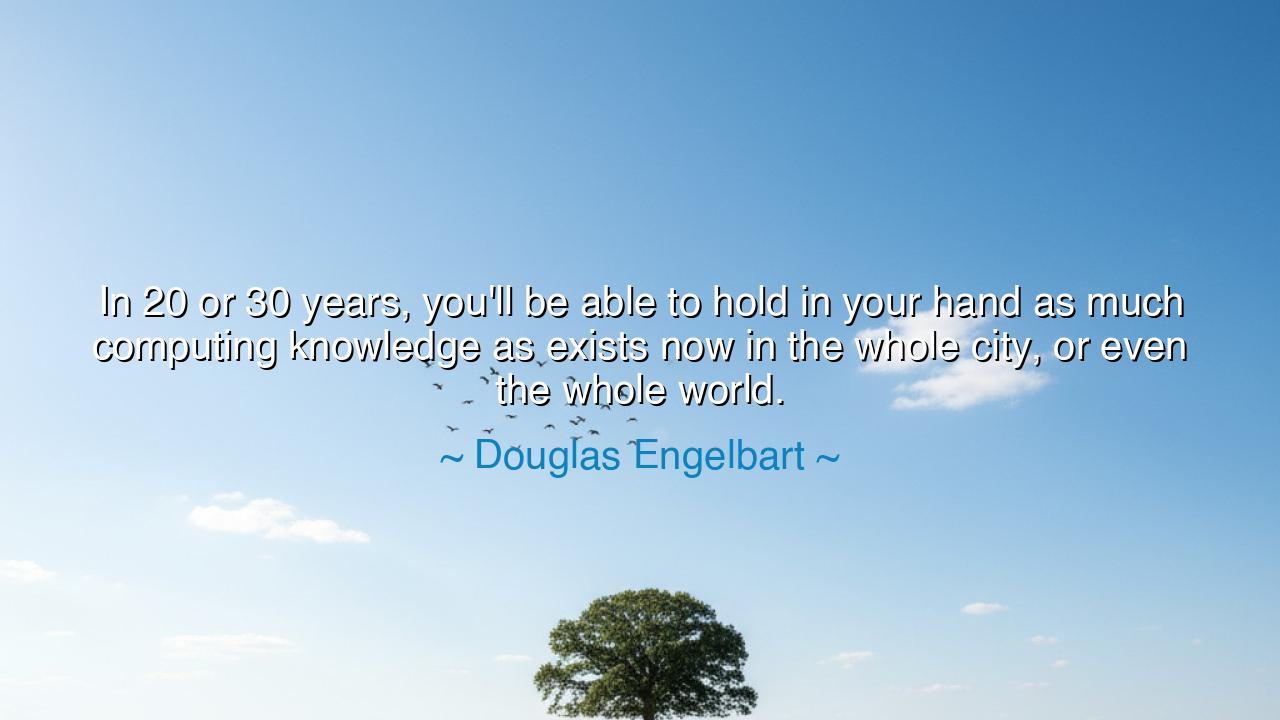
In 20 or 30 years, you'll be able to hold in your hand as much
In 20 or 30 years, you'll be able to hold in your hand as much computing knowledge as exists now in the whole city, or even the whole world.






Douglas Engelbart, the visionary who first dreamed of the mouse and the modern computer interface, once spoke words that sound almost like prophecy: “In 20 or 30 years, you’ll be able to hold in your hand as much computing knowledge as exists now in the whole city, or even the whole world.” At the time, these words may have seemed fantastical, like whispers of a future too bold to be believed. Yet today, we see their truth embodied in the devices we carry, where libraries, maps, histories, sciences, and voices of billions rest within the palm of a single hand.
The origin of this vision lies in Engelbart’s lifelong quest to expand human intellect through machines. He was not content with computers being vast and hidden in laboratories, reserved for the few. He saw their destiny as tools of the many, companions to human thought, amplifiers of wisdom. In speaking these words, he foresaw not only the shrinking of machines, but the expansion of their power to place the world’s knowledge within the reach of every soul.
History offers us the fulfillment of his prophecy. Consider the first computers of the mid-20th century: vast machines that filled entire rooms, consuming enormous energy, tended by specialists. To suggest that their power would one day be surpassed by a device no larger than a book, no heavier than a loaf of bread, seemed absurd. Yet the march of invention—transistors, microchips, networks, and the internet—carried us swiftly to this destiny. The smartphone, a tool so common that billions own it, is the very embodiment of Engelbart’s foresight: the world’s knowledge distilled into the hands of the individual.
The deeper meaning of Engelbart’s words is not merely technological but spiritual. He reminds us that progress, once kindled, accelerates. The knowledge of one age becomes the seed of the next, and what seems impossible today may become trivial tomorrow. But with such power comes responsibility. To hold the knowledge of the world in one’s hand is not only a triumph of engineering but a test of wisdom: will we use it to illuminate truth, or to spread confusion? Will it serve freedom, or enslavement? The device itself is neutral; it is the hand and heart that wield it which decide its destiny.
We can find an echo of this in ancient history as well. When Gutenberg’s press brought books to the masses, the knowledge once hoarded by scribes and scholars spread like fire. Some feared it would sow heresy and rebellion; others saw it as the dawn of enlightenment. So too with Engelbart’s vision: the hand that holds such a device holds both the key to liberation and the temptation of folly. Humanity’s challenge is not only to create but to wield wisely.
The lesson for us is urgent and clear: we must not mistake possession of knowledge for understanding, nor access for wisdom. To have the world in one’s pocket is not the same as to discern truth, to reflect, to grow in judgment. We must teach ourselves and our children not only to use the tools of technology, but to ask: What is worthy? What is true? What builds life and what destroys it? Without such guidance, the knowledge we hold may become a flood that drowns rather than a light that guides.
Practical action lies within our reach. Let us cultivate discipline in how we use our devices, not becoming slaves to distraction but masters of focus. Let us use the computing knowledge we hold not only for entertainment but for learning, for creativity, for connection that uplifts rather than divides. And let us remember Engelbart’s example: to dream not only of what is possible, but of how it may serve the greater good of humanity.
Thus his words, spoken decades ago, still resound like prophecy fulfilled: “You’ll be able to hold in your hand as much knowledge as the whole world.” Let us honor this gift not by treating it as trivial, but by using it as the ancients used fire—carefully, reverently, and always in the service of life. For in our hands now lies the world itself; and with it, the responsibility to guide humanity toward wisdom, not ruin.






AAdministratorAdministrator
Welcome, honored guests. Please leave a comment, we will respond soon